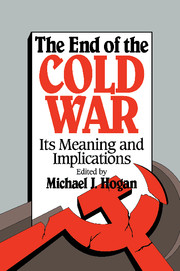Book contents
- Frontmatter
- Contents
- Preface
- The Authors
- Dedication
- 1 Introduction
- 2 An End to Which Cold War?
- 3 The Cold War, the Long Peace, and the Future
- 4 Quiet Cataclysm: Some Afterthoughts on World War III
- 5 Some Lessons from the Cold War
- 6 Nuclear Weapons and European Security during the Cold War
- 7 Victory in the Postwar Era: Despite the Cold War or Because of It?
- 8 The Wicked Witch of the West is Dead. Long Live the Wicked Witch of the East
- 9 The End and the Begining
- 10 A Balance Sheet: Lippmann, Kennan, and the Cold War
- 11 Why Did the Cold War Arise, and Why Did It End?
- 12 A View from Below
- 13 The End of the Cold War and the Middle East
- 14 The End of the Cold War in the Near East: What It Means for Historians and Policy Planners
- 15 After the Cold War: The United States, Germany, and European Security
- 16 The End of the Cold War: A Skeptical View
- 17 The End of the Cold War, the New Role for Europe, and the Decline of the United States
- 18 The Fading of the Cold War—and the Demystification of Twentieth-Century Issues
- 19 The U.S. Government, a Legacy of the Cold War
- 20 Foreign Policy, Partisan Politics, and the End of the Cold War
- 21 Beyond Bipolarity in Space and Time
- 22 A Usable Past for the Future
- Selective Bibliography
- Index
16 - The End of the Cold War: A Skeptical View
Published online by Cambridge University Press: 18 December 2009
- Frontmatter
- Contents
- Preface
- The Authors
- Dedication
- 1 Introduction
- 2 An End to Which Cold War?
- 3 The Cold War, the Long Peace, and the Future
- 4 Quiet Cataclysm: Some Afterthoughts on World War III
- 5 Some Lessons from the Cold War
- 6 Nuclear Weapons and European Security during the Cold War
- 7 Victory in the Postwar Era: Despite the Cold War or Because of It?
- 8 The Wicked Witch of the West is Dead. Long Live the Wicked Witch of the East
- 9 The End and the Begining
- 10 A Balance Sheet: Lippmann, Kennan, and the Cold War
- 11 Why Did the Cold War Arise, and Why Did It End?
- 12 A View from Below
- 13 The End of the Cold War and the Middle East
- 14 The End of the Cold War in the Near East: What It Means for Historians and Policy Planners
- 15 After the Cold War: The United States, Germany, and European Security
- 16 The End of the Cold War: A Skeptical View
- 17 The End of the Cold War, the New Role for Europe, and the Decline of the United States
- 18 The Fading of the Cold War—and the Demystification of Twentieth-Century Issues
- 19 The U.S. Government, a Legacy of the Cold War
- 20 Foreign Policy, Partisan Politics, and the End of the Cold War
- 21 Beyond Bipolarity in Space and Time
- 22 A Usable Past for the Future
- Selective Bibliography
- Index
Summary
Less than two years after the fall of the Berlin Wall, which led almost automatically to the reunification of Germany, one thing is certain: The division of Europe, for forty-five years the symbol of the Cold War, has come to an end. Beyond this not much can be said. Because of the swift succession of events, the most enticing assumptions about the future very quickly lose their credibility. This has been true of recent predictions by Paul Kennedy and Francis Fukuyama. Kennedy argues that “imperial overstretch” has led to a relative decline of American power and hence to a shift in the balance of global economic power. To his way of thinking, the United States should seek to redress the balance by reducing its excessive overseas commitments, spending less on defense, and devoting more of its resources to social and educational programs and to industrial investments. In an essay published in June 1990, Fukuyama presented an even bolder assessment of the past and prescription for the future. He asserted that the demise of fascism and Marxism-Leninism had brought about “the end of history,” a growing “Common marketization” of international relations, and a diminution of the likelihood of large-scale conflict between states. Subsequent developments have not been kind to these prescriptions.
In the wake of the Gulf war and the demise of the Soviet Union, the situation appears more complicated than either Kennedy or Fukuyama anticipated.
- Type
- Chapter
- Information
- The End of the Cold WarIts Meaning and Implications, pp. 185 - 194Publisher: Cambridge University PressPrint publication year: 1992
- 1
- Cited by



